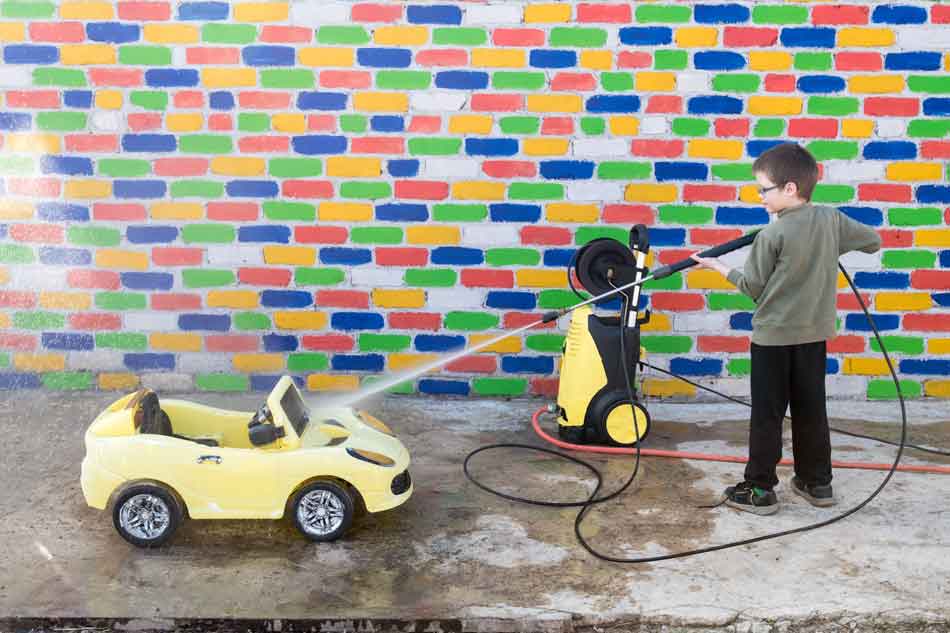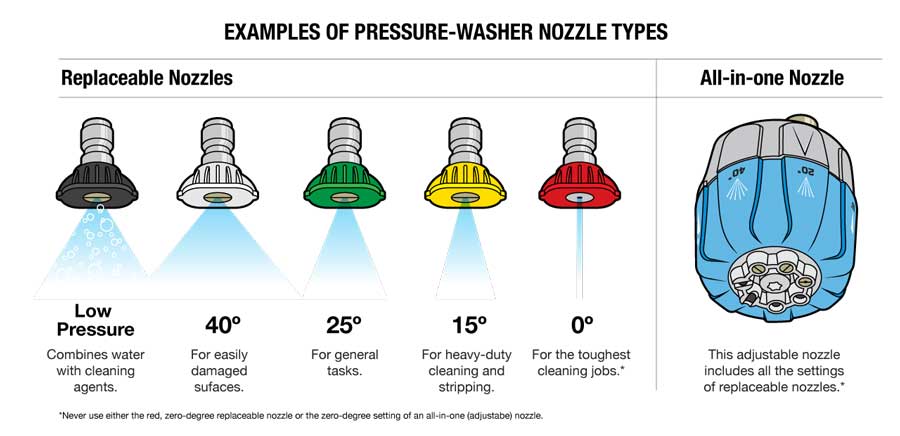After only a year, my brand-new garage floor looked worse for wear. It needed a good cleaning.
I wanted to buy a pressure washer, but because I had epoxy paint on my garage floor, I had to do some research beforehand.
You can pressure wash garage floors, but it might not be necessary. It’s safe to pressure wash untreated or painted garage floors using at least a 25-degree nozzle. Pressure washing isn’t recommended if you have a more durable garage floor coating (like epoxy). For regular cleaning, use a garden hose and a mop or medium bristle deck brush to wash your garage floor.
Pressure washing is a great way to clean your entire garage, including your garage door, not just your floor.
But before you run out and buy a pressure washer like I did, it’s essential to look at what kind of garage floor you have. Then, we will discuss some pressure washer basics so you can get the best results possible in the shortest amount of time.

Power Washer vs Pressure Washer
But first, here’s a quick fact I learned in my research: pressure washers and power washers are different things.
Like most people, I assumed they were just different names to call the same thing, but they’re not. There’s one big difference, and it all comes down to the temperature of the water.
A pressure washer uses cold water, and a power washer uses hot water. Because of the difference in water temperature, the power washer has to be constructed differently than a pressure washer.
Unfortunately, you can’t hook a hot water hose to a pressure washer. It’s likely going to damage the washer.
Power washers are used to clean exterior concrete where there’s a large amount of caked-on organic matter (dirt, bird poop, grass stains, etc.).
Unless your garage has tough stains like grease and dirt, you should pressure wash garage floors with a cleaning solution like Simple Green. That should remove most stains on your garage floor.
If you DO have grease or oil stains on your garage, you should take care of them first. Check out this article for more details on how to clean oil and grease off your garage floor.
What Kind of Garage Floor Do You Have?
I thought I had an epoxy floor.
I was wrong.
My contractor said he would throw in an epoxy coating for free. I was thrilled! I got epoxy paint.
There’s a big difference between epoxy coatings and epoxy paint.
An epoxy coating costs around $7 per square foot, around $2500 for a typical two-car garage. It’s incredibly durable, takes multiple days to complete, and typically has a high-gloss sheen.
Epoxy paint, on the other hand, is under $100. You can buy it at Lowe’s or Home Depot and finish it in a single afternoon. It offers more protection than regular acrylic paint, but it’s still paint.
It doesn’t protect concrete floors.
Alternatively, you could have bare, unfinished concrete or a garage tile like Swisstrax or RaceDeck.
Can You Pressure Wash Epoxy Floors?
Most people think epoxy floors are painted with a protective coating, but that’s not the case.
A proper epoxy floor is a thick, protective coating – not paint. The epoxy is created by combining an epoxide resin with a polyamine hardener. Putting the two compounds together causes a chemical reaction that cures (hardens) the coating.
Once fully hardened, the coating is pretty much bulletproof. Think of it like a clear coat for your garage floor.
Can you pressure wash an epoxy-coated floor? Yes, but you won’t need to. The curing process when you make the epoxy floor makes it resistant to damage and extremely easy to clean up. A simple mop or medium-bristle brush should remove almost anything.
Can You Pressure Wash Garage Floor Tiles like Swisstrax or RaceDeck?
High-quality injected-mold plastic tiles are incredibly durable. In fact, they’re likely to stand up better to pressure washing than your concrete floor will.
Garage tiles are molded from a single piece of plastic. That plastic is the same color the whole way through. That means no paint will chip or flake off during pressure washing.
As long as you don’t hammer them with a 0-degree nozzle, they can stand up to almost anything.
The only concern is to have adequate drainage underneath the tiles themselves.
If you have plastic garage tiles like the ones from Swisstrax or RaceDeck, you probably don’t need to pressure wash them. Still, it’s good to know they can withstand the pressure (pun intended).
What Do the Different Pressure Washer Nozzles Mean?
I’ve made some passing references to a 15-degree- and 0-degree nozzle. Let me go into more detail on that now because choosing the correct nozzle pattern can make cleaning your floor much faster.
Selecting the wrong pressure washer nozzle can actually damage your floor.
The numbers on the nozzles correspond to the degree of width of their pattern. For example, a 15-degree nozzle sprays the water out of the washer so that it spreads out 15 degrees.
The higher the number, the wider the pattern and the less force behind each water droplet.

A word of caution about the red 0-degree nozzle: It’s a laser beam made of water.
It may sound good to opt for this nozzle immediately, but high-pressure water will likely cut into your concrete floor while you’re trying to clean it.
Always start with a low-pressure nozzle and see if that does the job first.
Electric vs. Gas Pressure Washers for Garage Floors
I highly recommend buying an electric pressure washer if you’re a homeowner.
I’ll leave the specific recommendations about choosing the right pressure washer for someone else. I’ve only used the electric model I bought and one gas-powered pressure washer I rented.
Here are some general comments on the two types of pressure washers.
Gas powered pressure washers
A gas-powered pressure washer is undeniably more powerful but also a pain in the ***. It’s noisy, expensive to buy, and expensive to operate. You have to worry about gasoline spilling in your garage, driveway, or lawn.
Plus, storing gasoline and oil in your garage is unsafe, especially if you have children.
Gas-powered pressure washers start around the $350-$400 range for a 3000 PSI model but can go up quickly from there.
Electric pressure washers
On the other hand, electric pressure washers are half the cost (or less), cheaper to maintain, and safe around children and your home. They are, without a doubt, less powerful. The least powerful gas-powered pressure washer is usually stronger than a high-end electric pressure washer.
You can find electric pressure washers for under $100 for a 1500 PSI model, and they usually top out around $300 for a 2300 PSI model.
How much power do you need?
I’m all about more power (insert Tim Allen grunt here).
But do you really need that much water pressure?
You only need between 2000 and 3000 PSI to pressure wash garage floors or do general cleaning around the house.
By comparison, cleaning your car requires between 1500 and 2000 PSI.
Because my electric pressure washer is so portable and easy to use, I’ve found so many uses for it after I bought it.
It’s a quick job to bring it out to clean my garage door, porch, and driveway pavers or even pressure wash my car during Florida’s lovebug season.
Wrapping It Up
Pressure washing is a great way to get oil and grease stains off garage floors without damaging them.
With the correct pressure washer and a low-pressure tip, washing your garage floor can take half an hour instead of an entire afternoon.
